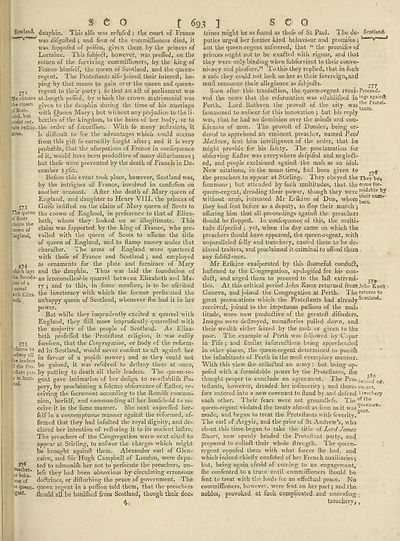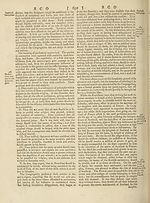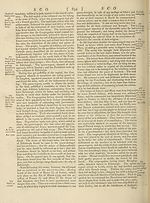Encyclopaedia Britannica, or, a Dictionary of arts, sciences, and miscellaneous literature : enlarged and improved. Illustrated with nearly six hundred engravings > Volume 18, RHI-SCR
(731) Page 693
Download files
Complete book:
Individual page:
Thumbnail gallery: Grid view | List view

SCO
Scotland.
t 693 J
SCO
572 .
Be obtains
! the crown
if Scot-
5 land, but
under cer¬
tain reftric-
Uons.
„ 573
fne queen
if Scots
:laims the
( Town of
! ingland,
674
chich lays
he found a
|ion of a
P tuarrel
rith Eliza-
ieth.
S7S
Icheme to
eftroy all
he leaders
f the Pro-
nftant par-
1 in Scot-
md.
$7«
feacher-
is beha-
1 our. of
■ >e queen-
;geet.
dauphin. Tliis alfo was refyfed : the court of France
was difgufted j and four of the commiffioners died, it
was fuppofed of poifon, given them by the princes of
Lorraine. This fubjeft, however, was preffed, on the
return of the furviving commillioners, by the king of
Fiance himfelf, the queen of Scotland, and the queen*
regent. The Proteftants alfo joined their intereif, ho¬
ping by that means to gain over the queen and queen-
regent to their party ; k> that an act of parliament was
at length pafifed, by which the crown matrimonial was
given to the dauphin during the time of his marriage
with Queen Mary •, but without any prejudice to the li¬
berties of the kingdom, to the heirs of her body, or to
the order of fucceiTion. With fo many reflraints, it
is difficult to fee the advantages which could accrue
from this gift fo earneftly fought after *, and it is very
probable, that the ufurpations of France in confequence
of it, would have been produdtive of many diflurbances j
but thefe were prevented by the death of Francis in De¬
cember 1560.
Before this event took place, however, Scotland was,
by the intrigues of France, involved in confufion on
another account. After the death of Mary queen of
England, and daughter to Henry VIII. the princes of
Guife infilled on the claim of Mary queen of Scots to
the crown of England, in preference to that of Eliza¬
beth, whom they looked on as illegitimate. This
claim was fupported by the king of France, who pre¬
vailed with the queen of Scots to aflume the title
of queen of England, and to llarap money under that
character. The arms of England were quartered
with thofe of France and Scotland $ and employed
as ornaments for the plate and furniture of Mary
and the dauphin. Thus was laid the foundation of
■an irreconcileable quarrel between Elizabeth and Ma¬
ry j and to this, in fome meafure, is to be afcribed
the inveteracy with which the former perfecuted the
unhappy queen of Scotland, whenever file had it in her
power.
But while they imprudently excited a quarrel with
England, they Hill more imprudently quarrelled with
the majority cf the people of Scotland. As Eliza¬
beth profefled the Proteftant religion, it was eafily
forefeen, that the Congregation, or body of the reform¬
ed in Scotland, would never confent to a£t againft her
in favour of a popiffi power , and as they could not
be gained, it was refolved to deftroy them at once,
by putting to death all their leaders. The queen-re¬
gent gave intimation of her defign to re-efiablifii Po¬
pery, by proclaiming a folemn obfervance of Eafter, re¬
ceiving the facrament according to the Romifh commu¬
nion, herfelf, and commanding all her houfehold to re¬
ceive it in the fame manner. She next exprefled her-
felf in a contemptuous manner againlt the reformed, af¬
firmed that they had infulted the royal dignity, and de¬
clared her intention of reftoring it to its ancient luftre.
The preachers of the. Congregation wer&> next cited to
appear at Stirling, to anfvver the charges which might
be brought againfi: them. Alexander earl of Glen-
cairn, and Sir Hugh Campbell of Loudon, were depu¬
ted to admonifh her not to perfecute the preachers, un-
lefs they had been obnoxious by circulating erroneous
doftrines, or difturbing the peace of government. The
queen regent in a paffion told them, that the preachers
fhould all.be banifhed from Scotland, though their doc-.
4;
trines might be as found as thole of St Paul. The de- Scotland^,
puties urged her former kind behaviour and pronufea j ' ^
but the queen-regent anfvvered, that “ the promifes of
princes ought not to be exadled with rigour, and that
they were only binding when fublervient to their eonve-
niency and pleafure.” To this they replied, that in fuch
a cafe they could not look on her as their fovtreign,and
muft renounce their allegiance as fubjefts.
Soon after tiiis tranladtion, the queen-regent recei-Proceed-
ved the news that the reformation was efiablifned in ,r)gs aga>nft
Perth. Lord lluthven the provoft of the city was
lummoned to anfwer for this innovation 5 but his reply
was, that he had no dominion over the minds and con-
fcienees of men. The provoft of Dundee, being or¬
dered to apprehend an eminent preacher, named Pan/
Methven, lent him intelligence of the order, that he
might provide for his fafety. The proclamation for
obferving Eafter was everywhere deipifed and neglect¬
ed, and people exclaimed againft the mafs as an idol.
New citations, in the mean time, had been given to
the preachers to appear at Stirling. They obeyed the They be',
fummons ; but attended by Inch multitudes, that theeomefor-
queen-regent, dreading their power, though they were ratable by
without anus, intreated Mr Erlkine of Dun, -whom num"
they had fent before as a deputy, to flop their match j
affuring him that all proceedings againft the preachers
fhould be flopped. In eonfequence of this, the multi¬
tude difperfed •, yet, when the day came on which the
preachers Ihould have appeared, the queen-regent, with
unparalleled folly and treachery, caufed them to be de¬
clared traitors, and proclaimed it criminal to afford them .
any fubfiftence.
Mr Erlkine exafperated by this lhameful condufl,
haftened to the Congregation, apologifed for his con-
du6t, and urged them to proceed to the laft extremi-
ties. At this critical period John Knox returned from John Knot
Geneva, and joined the Congregation at Perth. The returns to
great provocations which the Proteftants had already ^cot^an^*‘
received, joined to the impetuous paffions of the mul¬
titude, were now produ&ive of the greateft diforders.
Images were deftroyed, monafteries pulled down, and
their wealth either feized by the mob or given to the
poor. The example of Perth was followed by Cupar
in Fife j and fimilar infurreClions. being apprehended
in other places, the queen-regent determined to punilh
the inhabitants of Perth in the moft exemplary manner.
"With this view file colleded an army : but being op-
pofed with a formidable power by the Proteftanfs, {he
thought proper to conclude an agreement. The Pro-SeC(rI cj
teftants, however, dreaded her infincerity 5 and there-venart.
fore entered into a new covenant to Hand by and defend * reachery
each other. Their fears were not groundlefs. The t'ie
queen-regent violated the treaty almoft as foon as it was <J’K®n"r€'
made, and began to treat the Proteilants with feverity.
The earl of Argyle, and the prior of St Andrew’s, who
about this time began to take the title of Lord James
Stuart, now openly headed the Proteftant p^rty, and
prepared to colled their whole ftrength. The queen-
regent oppoled them with what forces Ihe had, and
which indeed chiefly confided of her French auxiliaries; .
but, being again afraid of coming to an engagement,
Ihe eonfented to a truce until commiffioners Ihould be
fent to treat with the lords for an effedual peace. No
commiffioners, however, were fent on her part; and the
nobles, provoked at fuck complicated and unceafing •
treachery, ,
Scotland.
t 693 J
SCO
572 .
Be obtains
! the crown
if Scot-
5 land, but
under cer¬
tain reftric-
Uons.
„ 573
fne queen
if Scots
:laims the
( Town of
! ingland,
674
chich lays
he found a
|ion of a
P tuarrel
rith Eliza-
ieth.
S7S
Icheme to
eftroy all
he leaders
f the Pro-
nftant par-
1 in Scot-
md.
$7«
feacher-
is beha-
1 our. of
■ >e queen-
;geet.
dauphin. Tliis alfo was refyfed : the court of France
was difgufted j and four of the commiffioners died, it
was fuppofed of poifon, given them by the princes of
Lorraine. This fubjeft, however, was preffed, on the
return of the furviving commillioners, by the king of
Fiance himfelf, the queen of Scotland, and the queen*
regent. The Proteftants alfo joined their intereif, ho¬
ping by that means to gain over the queen and queen-
regent to their party ; k> that an act of parliament was
at length pafifed, by which the crown matrimonial was
given to the dauphin during the time of his marriage
with Queen Mary •, but without any prejudice to the li¬
berties of the kingdom, to the heirs of her body, or to
the order of fucceiTion. With fo many reflraints, it
is difficult to fee the advantages which could accrue
from this gift fo earneftly fought after *, and it is very
probable, that the ufurpations of France in confequence
of it, would have been produdtive of many diflurbances j
but thefe were prevented by the death of Francis in De¬
cember 1560.
Before this event took place, however, Scotland was,
by the intrigues of France, involved in confufion on
another account. After the death of Mary queen of
England, and daughter to Henry VIII. the princes of
Guife infilled on the claim of Mary queen of Scots to
the crown of England, in preference to that of Eliza¬
beth, whom they looked on as illegitimate. This
claim was fupported by the king of France, who pre¬
vailed with the queen of Scots to aflume the title
of queen of England, and to llarap money under that
character. The arms of England were quartered
with thofe of France and Scotland $ and employed
as ornaments for the plate and furniture of Mary
and the dauphin. Thus was laid the foundation of
■an irreconcileable quarrel between Elizabeth and Ma¬
ry j and to this, in fome meafure, is to be afcribed
the inveteracy with which the former perfecuted the
unhappy queen of Scotland, whenever file had it in her
power.
But while they imprudently excited a quarrel with
England, they Hill more imprudently quarrelled with
the majority cf the people of Scotland. As Eliza¬
beth profefled the Proteftant religion, it was eafily
forefeen, that the Congregation, or body of the reform¬
ed in Scotland, would never confent to a£t againft her
in favour of a popiffi power , and as they could not
be gained, it was refolved to deftroy them at once,
by putting to death all their leaders. The queen-re¬
gent gave intimation of her defign to re-efiablifii Po¬
pery, by proclaiming a folemn obfervance of Eafter, re¬
ceiving the facrament according to the Romifh commu¬
nion, herfelf, and commanding all her houfehold to re¬
ceive it in the fame manner. She next exprefled her-
felf in a contemptuous manner againlt the reformed, af¬
firmed that they had infulted the royal dignity, and de¬
clared her intention of reftoring it to its ancient luftre.
The preachers of the. Congregation wer&> next cited to
appear at Stirling, to anfvver the charges which might
be brought againfi: them. Alexander earl of Glen-
cairn, and Sir Hugh Campbell of Loudon, were depu¬
ted to admonifh her not to perfecute the preachers, un-
lefs they had been obnoxious by circulating erroneous
doftrines, or difturbing the peace of government. The
queen regent in a paffion told them, that the preachers
fhould all.be banifhed from Scotland, though their doc-.
4;
trines might be as found as thole of St Paul. The de- Scotland^,
puties urged her former kind behaviour and pronufea j ' ^
but the queen-regent anfvvered, that “ the promifes of
princes ought not to be exadled with rigour, and that
they were only binding when fublervient to their eonve-
niency and pleafure.” To this they replied, that in fuch
a cafe they could not look on her as their fovtreign,and
muft renounce their allegiance as fubjefts.
Soon after tiiis tranladtion, the queen-regent recei-Proceed-
ved the news that the reformation was efiablifned in ,r)gs aga>nft
Perth. Lord lluthven the provoft of the city was
lummoned to anfwer for this innovation 5 but his reply
was, that he had no dominion over the minds and con-
fcienees of men. The provoft of Dundee, being or¬
dered to apprehend an eminent preacher, named Pan/
Methven, lent him intelligence of the order, that he
might provide for his fafety. The proclamation for
obferving Eafter was everywhere deipifed and neglect¬
ed, and people exclaimed againft the mafs as an idol.
New citations, in the mean time, had been given to
the preachers to appear at Stirling. They obeyed the They be',
fummons ; but attended by Inch multitudes, that theeomefor-
queen-regent, dreading their power, though they were ratable by
without anus, intreated Mr Erlkine of Dun, -whom num"
they had fent before as a deputy, to flop their match j
affuring him that all proceedings againft the preachers
fhould be flopped. In eonfequence of this, the multi¬
tude difperfed •, yet, when the day came on which the
preachers Ihould have appeared, the queen-regent, with
unparalleled folly and treachery, caufed them to be de¬
clared traitors, and proclaimed it criminal to afford them .
any fubfiftence.
Mr Erlkine exafperated by this lhameful condufl,
haftened to the Congregation, apologifed for his con-
du6t, and urged them to proceed to the laft extremi-
ties. At this critical period John Knox returned from John Knot
Geneva, and joined the Congregation at Perth. The returns to
great provocations which the Proteftants had already ^cot^an^*‘
received, joined to the impetuous paffions of the mul¬
titude, were now produ&ive of the greateft diforders.
Images were deftroyed, monafteries pulled down, and
their wealth either feized by the mob or given to the
poor. The example of Perth was followed by Cupar
in Fife j and fimilar infurreClions. being apprehended
in other places, the queen-regent determined to punilh
the inhabitants of Perth in the moft exemplary manner.
"With this view file colleded an army : but being op-
pofed with a formidable power by the Proteftanfs, {he
thought proper to conclude an agreement. The Pro-SeC(rI cj
teftants, however, dreaded her infincerity 5 and there-venart.
fore entered into a new covenant to Hand by and defend * reachery
each other. Their fears were not groundlefs. The t'ie
queen-regent violated the treaty almoft as foon as it was <J’K®n"r€'
made, and began to treat the Proteilants with feverity.
The earl of Argyle, and the prior of St Andrew’s, who
about this time began to take the title of Lord James
Stuart, now openly headed the Proteftant p^rty, and
prepared to colled their whole ftrength. The queen-
regent oppoled them with what forces Ihe had, and
which indeed chiefly confided of her French auxiliaries; .
but, being again afraid of coming to an engagement,
Ihe eonfented to a truce until commiffioners Ihould be
fent to treat with the lords for an effedual peace. No
commiffioners, however, were fent on her part; and the
nobles, provoked at fuck complicated and unceafing •
treachery, ,
Set display mode to:
![]() Universal Viewer |
Universal Viewer | ![]() Mirador |
Large image | Transcription
Mirador |
Large image | Transcription
Images and transcriptions on this page, including medium image downloads, may be used under the Creative Commons Attribution 4.0 International Licence unless otherwise stated. ![]()
| Permanent URL | https://digital.nls.uk/193028210 |
|---|
| Attribution and copyright: |
|
|---|
| Description | Ten editions of 'Encyclopaedia Britannica', issued from 1768-1903, in 231 volumes. Originally issued in 100 weekly parts (3 volumes) between 1768 and 1771 by publishers: Colin Macfarquhar and Andrew Bell (Edinburgh); editor: William Smellie: engraver: Andrew Bell. Expanded editions in the 19th century featured more volumes and contributions from leading experts in their fields. Managed and published in Edinburgh up to the 9th edition (25 volumes, from 1875-1889); the 10th edition (1902-1903) re-issued the 9th edition, with 11 supplementary volumes. |
|---|---|
| Additional NLS resources: |
|

